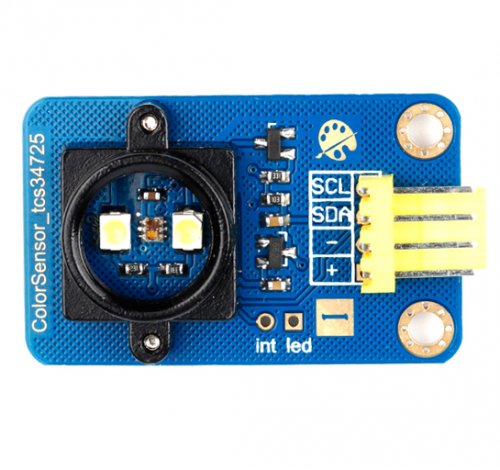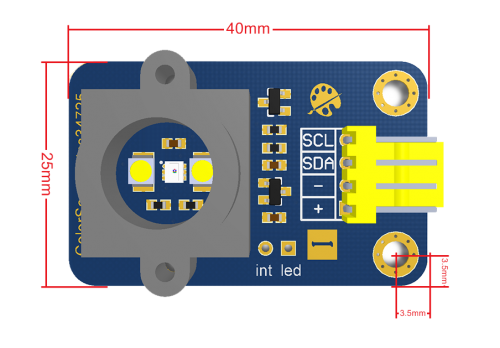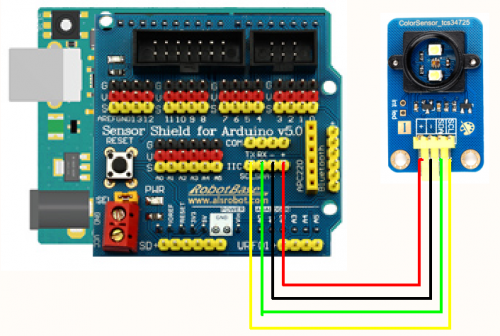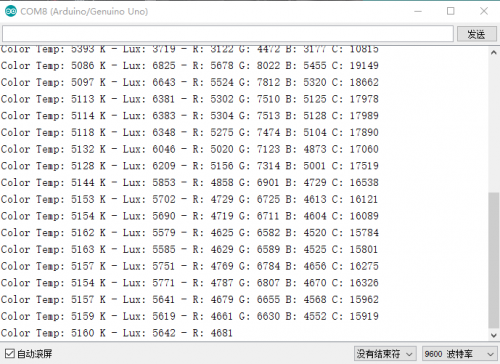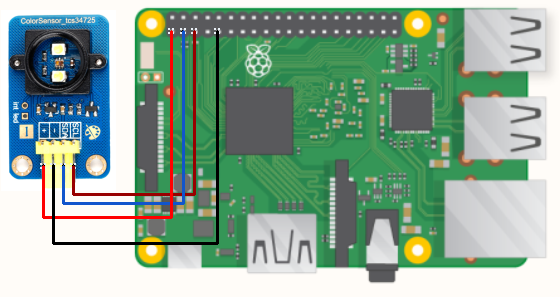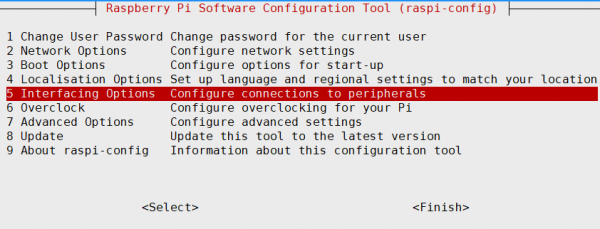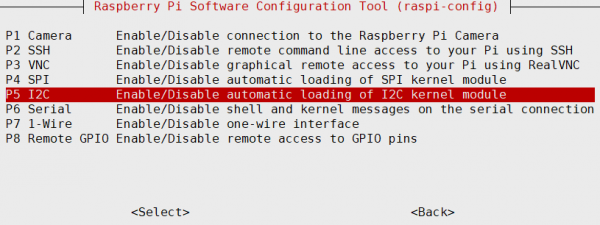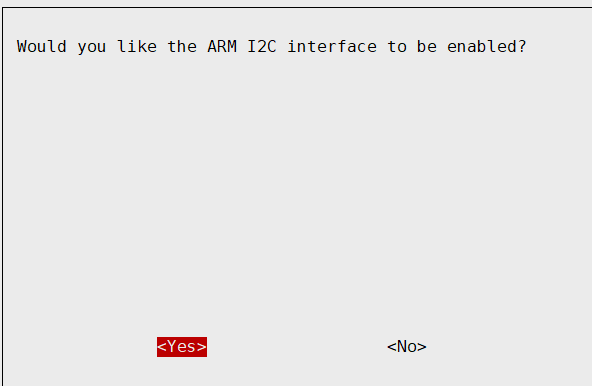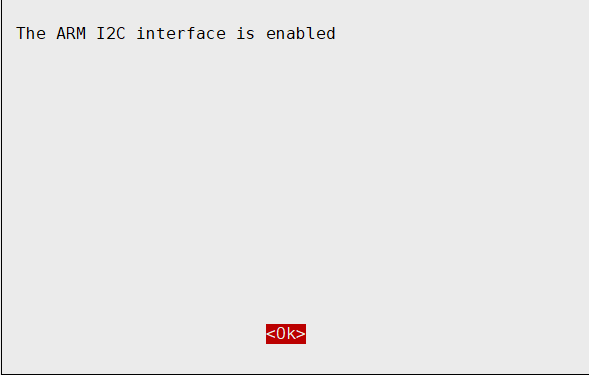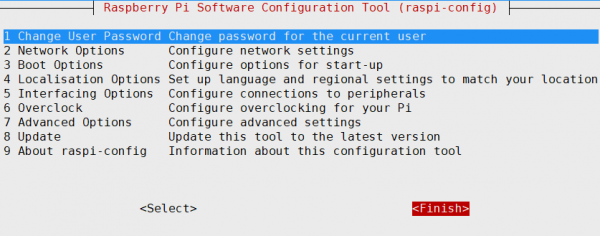“SKU:RB-02S161 IIC 颜色传感器”的版本间的差异
(→example_Raspberry Pi) |
(→example2_Arduino) |
||
| 第88行: | 第88行: | ||
打开 Arduino IDE 自带的串口监视器,将颜色传感器放于不同颜色的表面,可以看到串口监视器中打印不同的数值 | 打开 Arduino IDE 自带的串口监视器,将颜色传感器放于不同颜色的表面,可以看到串口监视器中打印不同的数值 | ||
[[文件:02S16103.png|500px|缩略图|居中]] | [[文件:02S16103.png|500px|缩略图|居中]] | ||
| − | |||
| − | |||
| − | |||
| − | |||
| − | |||
| − | |||
| − | |||
| − | |||
| − | |||
| − | |||
| − | |||
| − | |||
| − | |||
| − | |||
| − | |||
| − | |||
| − | |||
| − | |||
| − | |||
| − | |||
| − | |||
| − | |||
| − | |||
| − | |||
| − | |||
| − | |||
| − | |||
| − | |||
| − | |||
| − | |||
| − | |||
| − | |||
| − | |||
| − | |||
| − | |||
| − | |||
| − | |||
| − | |||
| − | |||
| − | |||
| − | |||
| − | |||
| − | |||
| − | |||
| − | |||
| − | |||
| − | |||
| − | |||
| − | |||
| − | |||
| − | |||
| − | |||
| − | |||
| − | |||
| − | |||
| − | |||
| − | |||
| − | |||
| − | |||
| − | |||
| − | |||
| − | |||
| − | |||
| − | |||
| − | |||
| − | |||
| − | |||
| − | |||
| − | |||
| − | |||
| − | |||
| − | |||
| − | |||
| − | |||
| − | |||
| − | |||
| − | |||
| − | |||
| − | |||
| − | |||
| − | |||
| − | |||
| − | |||
| − | |||
| − | |||
| − | |||
| − | |||
| − | |||
| − | |||
| − | |||
| − | |||
| − | |||
| − | |||
| − | |||
| − | |||
| − | |||
| − | |||
| − | |||
| − | |||
| − | |||
| − | |||
| − | |||
| − | |||
| − | |||
| − | |||
| − | |||
| − | |||
| − | |||
| − | |||
| − | |||
| − | |||
===example_Raspberry Pi=== | ===example_Raspberry Pi=== | ||
2019年11月26日 (二) 16:30的版本
目录 |
产品概述
IIC颜色传感器使用TCS34725颜色传感器进行颜色识别。TCS34725是一款高性价比的RGB全彩颜色识别传感器,传感器通过光学感应来识别物体的表面颜色。支持红、绿、蓝(RGB)三基色,支持明光感应,可以输出对应的具体数值,帮助您还原颜色本真。
为了提高精度,防止周边环境干扰,我们在传感器上添加了一个镜头罩,有效减少外界杂光干扰传感器,让颜色管理更加准确。板载自带2个高亮LED,可以让传感器在低环境光的情况下依然能够正常使用,实现“补光”的功能。模块采用I2C通信,拥有4P防插反接口,更加便利。
产品参数
基本参数
1.品名:IIC颜色传感器
2.货号:RB-02S161
3.品牌:奥松机器人
4.产地:哈尔滨
5.尺寸:25*40
6.固定孔:M3*2
电气参数
1.接口类型:KF2510-4P防插反接口
2.信号类型:IIC通讯
3.指示灯:高亮LED
4.工作电压:5V
5.工作电流:100mA
6.引脚定义:
- +:电源正极
- -:电源负极
- SDA:IIC数据端口
- SCL:IIC时钟端口
7.扩展接口:
- LED:两个板载LED控制端口,悬空或高电平点亮,低电平熄灭
- INT:中断引脚
8.连接线:4P 传感器连接线
9.检测范围:红、绿、蓝及白光检测
10.工作温度:-40 - 85℃
产品尺寸图:
使用方法
example1_Arduino
- 主要硬件
- Arduino UNO 控制器
- 传感器扩展板 V5.0
- IIC 颜色传感器
- USB 数据线
- 硬件连接
- 示例程序
/* Example code for the ALS_TCS34725 breakout library */
/* Connect SCL to analog 5
Connect SDA to analog 4
Connect VDD to 5V DC
Connect GROUND to common ground */
#include <Wire.h>
#include "ALS_TCS34725.h"
ALS_TCS34725 tcs = ALS_TCS34725(TCS34725_INTEGRATIONTIME_700MS, TCS34725_GAIN_1X);
void setup(void) {
Serial.begin(9600);
if (tcs.begin()) {
Serial.println("Found sensor");
} else {
Serial.println("No TCS34725 found");
while (1);
}
}
void loop(void) {
uint16_t r, g, b, c, colorTemp, lux;
tcs.getRawData(&r, &g, &b, &c);
colorTemp = tcs.calculateColorTemperature(r, g, b);
lux = tcs.calculateLux(r, g, b);
Serial.print("Color Temp: "); Serial.print(colorTemp, DEC); Serial.print(" K - ");
Serial.print("Lux: "); Serial.print(lux, DEC); Serial.print(" - ");
Serial.print("R: "); Serial.print(r, DEC); Serial.print(" ");
Serial.print("G: "); Serial.print(g, DEC); Serial.print(" ");
Serial.print("B: "); Serial.print(b, DEC); Serial.print(" ");
Serial.print("C: "); Serial.print(c, DEC); Serial.print(" ");
Serial.println(" ");
}
- 程序效果
打开 Arduino IDE 自带的串口监视器,将颜色传感器放于不同颜色的表面,可以看到串口监视器中打印不同的数值
example_Raspberry Pi
- 使用软件
- 编程软件:Python 2.7.13
- 操作系统:Linux raspberrypi 4.14.50
- 前提:PC 端已通过 SSH 软件登陆到 RaspberryPi 控制器
- 主要硬件
- Raspberry Pi 控制器
- Raspberry Pi GPIO 扩展板
- 16G SD 卡
- 5V 2.5A 电源适配器
- 公母头连接线
- 面包板
- TCS34725 颜色传感器
- 硬件连接
- 示例程序
1.使用 FileZilla 软件,将文件夹(TCS34725-RPi)拷贝到树莓派中
2.进入文件夹 TCS34725-RPi 使用命令
cd TCS34725-RPi
3.安装需要用到的库文件,安装完成后会提示 Finished
sudo python setup.py install
4.打开树莓派的 IIC
sudo raspi-config
选择第五项
选择I2C
使用 TAB 键选择 YES,单击回车
再次单击回车
使用 TAB 键选择 Finish,然后单击回车,完成开启 IIC 的配置
执行程序:进入程序目录,可以使用 ls 查看代码是否在当前目录下,使用下列命令执行例程
sudo python simpletest.py
# Simple demo of reading color data with the TCS34725 sensor.
# Will read the color from the sensor and print it out along with lux and
# color temperature.
# Author: Tony DiCola
# License: Public Domain
import time
# Import the TCS34725 module.
import TCS34725
# Create a TCS34725 instance with default integration time (2.4ms) and gain (4x).
import smbus
tcs = TCS34725.TCS34725()
# You can also override the I2C device address and/or bus with parameters:
#tcs = TCS34725.TCS34725(address=0x30, busnum=2)
# Or you can change the integration time and/or gain:
#tcs = TCS34725.TCS34725(integration_time=TCS34725.TCS34725_INTEGRATIONTIME_700MS,
# gain=TCS34725.TCS34725_GAIN_60X)
# Possible integration time values:
# - TCS34725_INTEGRATIONTIME_2_4MS (2.4ms, default)
# - TCS34725_INTEGRATIONTIME_24MS
# - TCS34725_INTEGRATIONTIME_50MS
# - TCS34725_INTEGRATIONTIME_101MS
# - TCS34725_INTEGRATIONTIME_154MS
# - TCS34725_INTEGRATIONTIME_700MS
# Possible gain values:
# - TCS34725_GAIN_1X
# - TCS34725_GAIN_4X
# - TCS34725_GAIN_16X
# - TCS34725_GAIN_60X
# Disable interrupts (can enable them by passing true, see the set_interrupt_limits function too).
tcs.set_interrupt(False)
# Read the R, G, B, C color data.
r, g, b, c = tcs.get_raw_data()
# Calculate color temperature using utility functions. You might also want to
# check out the colormath library for much more complete/accurate color functions.
color_temp = TCS34725.calculate_color_temperature(r, g, b)
# Calculate lux with another utility function.
lux = TCS34725.calculate_lux(r, g, b)
# Print out the values.
print('Color: red={0} green={1} blue={2} clear={3}'.format(r, g, b, c))
# Print out color temperature.
if color_temp is None:
print('Too dark to determine color temperature!')
else:
print('Color Temperature: {0} K'.format(color_temp))
# Print out the lux.
print('Luminosity: {0} lux'.format(lux))
# Enable interrupts and put the chip back to low power sleep/disabled.
tcs.set_interrupt(True)
tcs.disable()
- 程序效果
相关资料
- IIC 颜色传感器 datasheet & 示例程序
下载链接:https://pan.baidu.com/s/1o2l7MoCGbaR_o64IlEOPLA 密码:311e
